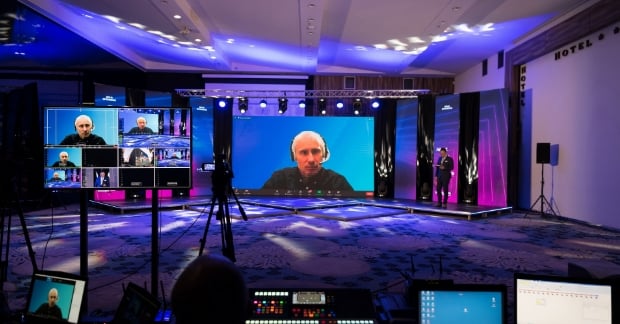In our recent tech marketing survey about trade shows, 76% of tech companies tried sponsoring virtual events during the pandemic. The bad news? They reported that lead quality was substantially lower than with in-person events.
That’s disappointing because virtual events are a great option for many businesses: they’re more accessible, can handle more attendees and they don’t have to consider big-ticket items like employee travel (thus being much more cost-effective). It is also much easier to turn a virtual event into a piece of content for your marketing efforts in comparison to an in-person event.
So how can you increase ROI and lead quality when it comes to virtual trade shows? We’ve got you covered.
Plan ahead and be selective
Just because an event is virtual doesn’t mean you should skimp on the time it takes to plan, promote and execute accordingly.
Take a look at what content is being shared most often in your industry (including what’s being engaged with the most on your own site), review social media engagement, check your ad performance and always perform keyword research to fully construct a picture of what your audience will care about. This will prevent you from sponsoring events that mean very little to your clientele.
If you're trying to build your brand or authority in a niche market, consider spending a bit more on a specialized event rather than sponsoring multiple general events. This way you are more likely to get relevant leads—remember quality over quantity.
Finally, don’t overdo it on sponsorships. More ≠ better. If there are tons of organizations asking for sponsorships, or you’ve already had dozens of other virtual events, maybe dial it back and spend more time and budget on a really great or specific event.
Nurture your audience
The lead-up to the event is almost as important as the event itself, and properly nurturing your audience is half the battle. While the event host will typically share sponsors (depending on your contribution size) this shouldn’t deter you from sharing it among your own audience. Use all possible outlets (as appropriate for the scale of the attendees) to find and guide your contacts to the event:
Email nurtures
- Beyond your typical notification of sponsoring the show, consider sending an email each week with a relevant blog, report or another piece of content to increase anticipation.
- You should also add the event to your standard newsletters or other consistent email communications.
Social media
- Utilize paid and organic social media, including outlets you may not have considered in the past—sometimes stretching out of your comfort zone can get you great leads!
Advertisements
- If it’s within your budget for the event, consider advertising on affiliate sites or even dipping your toe into PPC. This is also a great opportunity to test new outlets like Facebook aka Meta to reach a wider audience.
- Adding a pop-up to your homepage or relevant content landing pages/blogs is also a great free way to advertise.
Don’t skip on word-of-mouth marketing
- Communicate regularly with your sales team — make sure they’re sharing the event with existing clients and contacts. Crafting an email for them to send over or drafting a sample phone conversation can make a huge impact.
Keep your audience engaged
If you’ve sponsored a specific package that allows you to present or guide break-out sessions, you want people to stay through your entire portion, and more importantly, become a lead. If you make it memorable, people are much more likely to stay connected with you and consider you for the future.
We’ve all been there—10 minutes into what was supposed to be a “mindblowing” presentation at an event or trade show and people are dropping like flies (literally and metaphorically).
47% of attendees are more likely to ask a question at a virtual event and 37% are more likely to take action in a virtual event than on a live one—use this to your advantage! Consider spending additional time on your presentation (animations or videos are much more dynamic than a plain PowerPoint), interactively polling your audience and using a charismatic speaker are all great ways to keep people’s focus.
Make sure to research the platform the host is using beforehand. There are a plethora of options outside of the standard lot that are utilized by companies for virtual events — and many offer unique ways to keep people in tune with your presentation (Taggbox, Meetup and Hopin are just a few examples). If you know which one they’re using, you can alter your session and build presentations around the features the platform offers in order to fully embrace your options.
Even more, you can offer small gifts as you would at an in-person event sent to attendees (t-shirts, pens, cups, etc.)…or you can consider raffling off a large gift at the end, such as a tablet, smartwatch, e-reader or otherwise. Digital gift cards or exclusive access to a piece of content before the rest of your clientele are also great ways to keep your audience invested.
It’s not over when you hit “end”
So the event went off without a hitch, great! Now what?
Hate to break it to you, but you’re not done yet! You need to actively nurture your contacts after the event is through. Sending the recording and presentation deck in a thank you email is the minimum, but consider following up with affiliate links, content, or an exclusive white paper you typically have gated on your site.
Guiding them into a nurture that follows up with new content related to the trade show and informs them of future events you host or sponsor feels personal — which can improve your lead quality.
Overall, don’t get discouraged if the leads aren’t flooding your inbox. Just like any campaign, consider a virtual event as one piece in your greater marketing strategy — continuing to nurture the leads from the trade show and sponsoring more than one will certainly keep things moving in the right direction.






